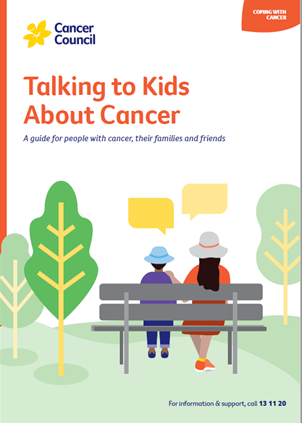- Home
- About Cancer
- Schools and teachers
- Cancer in the school community
- When a family member has cancer
- Talking about cancer
Talking about cancer
Children and adolescents will vary in how comfortable they feel talking about cancer. A young person may want to keep school as a place where they don’t have to constantly think about their family member’s cancer. You should never force a student to discuss the disease.
If a student whose parent or sibling has cancer would like to talk about their situation, you may want to involve members of your school’s student wellbeing team, learning and support team, or the school counsellor. If the student shows signs of prolonged distress, such as marked changes in their behaviour, refer them to professional counselling support. This can be arranged by the school counsellor.
Effective communication strategies
When talking to a student about their family member’s cancer, you will naturally tailor your conversation according to their age and responses (see Different views of cancer). It is also worth keeping in mind a few general pointers:
- Use words they can understand.
- Find out what they already know.
- Be honest.
- Offer a listening ear.
- Don’t make promises you cannot keep.
- Show your own emotions.
For more information, see Talking to kids about cancer. This may help you with strategies for discussing cancer in a school setting. You can also pass it on to parents if they are interested. Call 13 11 20 for a free copy, or download it from this page.
You can also listen to our podcast below for tips on how to talk to kids of all ages about cancer.
One friend would ask how I was going but I’d snap at her because I didn’t want to talk about it. I didn’t want to think about it, I didn’t want to know about it.
– Read more of Emma’s story
→ READ MORE: When a staff member has cancer
Podcast: Explaining Cancer to Kids
Listen to more episodes from our podcast for people affected by cancer
More resources
Claire Tobin, Principal Medical Advisor, Department of Education and Training, VIC; Dr Antoinette Anazodo, Paediatric and Adolescent Oncologist, Sydney Children’s Hospital and Prince of Wales Hospital, Director of The Sydney Youth Cancer Service, and Conjoint Senior Researcher, University of New South Wales, NSW; Lisa Barrow, Clinical Nurse Educator, Children’s Cancer Centre, Royal Children’s Hospital, Melbourne, VIC; Margo Bulic, Psychosocial Support Worker, CanTeen, ACT; Amber Copeland, 13 11 20 Consultant, Cancer Council Queensland; Donna Drew, Clinical Nurse Consultant, Paediatric Oncology/Palliative Care, Kids Cancer Centre, Sydney Children’s Hospital, Randwick, NSW; Allesha Fecondo, Education Consultant, Victorian Paediatric Rehabilitation Service, and Education Liaison, Ronald McDonald Learning Program, Ronald McDonald House Charities Australia, VIC; John Friedsam, General Manager of Divisions, CanTeen Australia, NSW; Pina Hutcheson, President, Catholic Primary Principals’ Association of WA; Cara Irvine, Year 8 Coordinator, Alfred Deakin High School, ACT; Andrew Long, Assistant Director, Policy and Research, Independent Schools Council of Australia, ACT; Dr Alistair Lum, Post-doctoral Research Fellow – Behavioural Sciences Unit, Sydney Children’s Hospital, University of New South Wales, NSW; Kristine Luszczynski, Learning Program Manager, Quality and Standards, Ronald McDonald House Charities Australia, NSW; Anita Neville, National Manager, Ronald McDonald Learning Program, Ronald McDonald House Charities Australia, VIC; NSW Department of Education, NSW; Mandy Roney, Consumer; Shannon Rush, Primary School Program Manager, Camp Quality, SA; Luke Wade, Education and Career Support Consultant, Redkite, QLD.
View the Cancer Council NSW editorial policy.
View all publications or call 13 11 20 for free printed copies.
Need to talk?
Support services
Coping with cancer?
Speak to a health professional or to someone who has been there, or find a support group or forum
Looking for transport, accommodation or home help?
Practical advice and support during and after treatment
Cancer information
Dealing with the diagnosis
Common reactions to a cancer diagnosis and how to find hope
Cancer in the School Community – Chapter 4
Click on the link above to download the information on this page as a PDF

